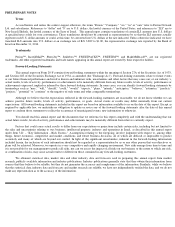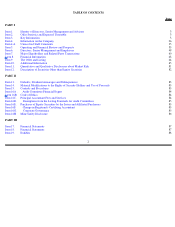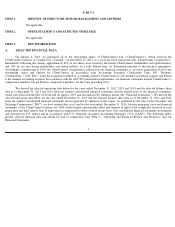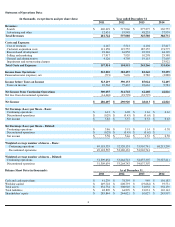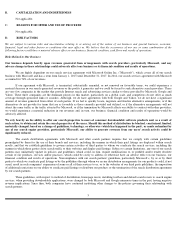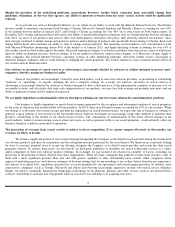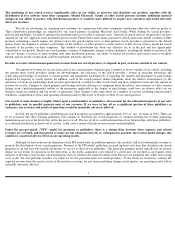Incredimail 2014 Annual Report Download - page 15
Download and view the complete annual report
Please find page 15 of the 2014 Incredimail annual report below. You can navigate through the pages in the report by either clicking on the pages listed below, or by using the keyword search tool below to find specific information within the annual report.
We depend on a third party Internet and telecommunication providers to operate our websites and web-
based services. Temporary
failure of these services, including catastrophic or technological interruptions, would materially reduce our revenues and damage our
reputation, and securing alternate sources for these services could significantly increase our expenses and be difficult to obtain.
Each of our third party Internet and telecommunication providers may not continue to provide services to us without disruptions at the
current cost or at all. Moreover, as traffic to our websites and applications increases and the number of new (and presumably more complex)
products and services that we introduce continues to rise, we will need to upgrade our systems, infrastructures and technologies generally to
facilitate this growth. Although there is certain overlap between the companies that provide such services, such a disruption in services by any
one of them, even if temporary, would reduce our revenues from product sales and possibly even from search, depending on the extent of
disruption. We also rent the services of approximately 260 servers located around the world, mainly through Amazon Web Services. While we
believe that there are many alternative providers of hosting and other communication services available to us, the costs associated with any
transition to a new service provider could be substantial and require us to reengineer our computer systems and telecommunications
infrastructure to accommodate a new service provider. Such processes could be both expensive and time consuming and could result in lost
business both during the transition period and after.
Our servers and communications systems could be damaged or interrupted by fire, flood, power loss, telecommunications failure,
earthquakes, acts of war or terrorism, acts of God, computer viruses, physical or electronic break-
ins and similar events or disruptions. Although
we maintain back-
up systems for our servers, any of these events could cause deterioration in performance or interruption in these systems,
delays, and loss of critical data and registered users and revenues.
We currently rely solely on the Internet as a means to sell our products. Accordingly, if we, or our customers, are unable to utilize the
Internet due to a failure of technology or infrastructure, hacking, terrorist activity or other reasons, we could lose current or potential customers
and revenues. While we have backup systems for most aspects of our operations, our systems are not fully redundant and our disaster recovery
planning may not be sufficient for all eventualities. In addition, we may have inadequate insurance coverage to compensate us for losses from a
major interruption. Furthermore, interruptions in our website could materially impede our ability to attract new companies to advertise on our
website and to maintain relationships with current advertisers. Difficulties of this kind could damage our reputation, be expensive to remedy and
curtail our growth.
Our products operate in a variety of computer configurations and could contain undetected errors or defects that could result in
product failures, lost revenues and loss of market share.
Our software may contain undetected errors, failures or defects, especially when the products are first introduced or when new versions
are released. Our customers’ computer environments are often characterized by a wide variety of standard and non-
standard configurations that
make pre-release testing for programming or compatibility errors very difficult and time-
consuming. As a result, there could be errors or failures
in our products. In addition, despite testing by us and beta testing by some of our registered users, errors, failures or bugs may not be found in
new products or releases until after commencement of commercial sales. In the past, we have discovered software errors, failures and defects in
certain of our product offerings after their full introduction and have experienced delayed or lost revenues during the period required to correct
these errors.
Errors, failures or defects in products released by us could result in negative publicity, product returns, loss of or delay in market
acceptance of our products, loss of competitive position or claims by customers. Alleviating any of these problems could require significant
expense and resources and could cause interruptions.
Due to our evolving business model and rapid changes in the Internet and the nature of services, particularly mobile advertising
platforms, we may not be able to accurately predict our future performance or increase revenue or profitability.
As a result of the volatile and declining nature of our search revenues, we have decided to develop and focus future growth efforts on
mobile advertising platforms. We have no history of ongoing operations from which to predict our future performance, and making such
predictions is very complex and challenging, particularly with regard to aggressively increasing the distribution and profitability of these
platforms as well as maintaining our existing business. The future viability of our business will greatly depend on our ability to offer a robust,
stable and efficient platform for our partners in the mobile advertising market, as well as adapting and creating new platforms in this market. If
we are unsuccessful in doing so in a timely fashion, we may not be able to achieve revenue growth or increase our profitability.
11


